Ogri
The Ogri were a species of silicon-based lifeforms native to Ogros. They resembled large rocks.
Biology[[edit] | [edit source]]
The Ogri looked like large rocks, usually taller than a human, but irregular in shape. They were large, slow and heavy (sometimes weighing as much as three and a half tons), but they could take a lot of damage, both energy-based and physical. When awake, they would glow and make a loud rumbling noise. Like other silicon-based species, they broke down into grit when killed and also left silicon behind when they moved. (TV: The Stones of Blood)
Ogri could survive erosion. As sand, they could still attack other living beings. They could use the skeletons of their victims to give themselves structure. (COMIC: Seaside Rendezvous)
They fed on various types of proteins which were common on Ogros. When on Earth, the Ogri relied on blood globulin, which they could absorb by touch. They had long lifespans, living for thousands of years. Ogri were not shown to communicate and did not show any signs of significant intelligence, although they were seen to respond to orders. (TV: The Stones of Blood) They could be modified to give them intelligence. (PROSE: Legacy)
History[[edit] | [edit source]]
Circa 2000 BC, Cessair of Diplos took three Ogri from Ogros to use as protection. Cessair was captured by the Megara, but she took control of their ship and landed it on Earth in Boscombe Moor. She hid the Ogri in the Gorsedd of Boscombe Moor. These Ogri waited with the Gorsedd and it became known as the Nine Travellers, even though there were only six stones. The Ogri were fed blood by Cessair and her followers.
In 1754, Thomas Borlase did a survey of the Nine Travellers, although at the time at least one of the Ogri was not present and he recorded that there were less than nine stones. Just after the survey was completed, he was killed by an Ogri.
In 1820, Thomas Bright did a survey of the Travellers. He counted a different amount of stones than Borlase. (TV: The Stones of Blood)
In 1826, the crew of the Camara discovered an Ogri on one of their voyages and decided to bring it back England. During the trip, the Ogri killed three of the ship's crew members. When the ship reached the Irish Sea, the crew decided to throw the Ogri overboard instead of bringing it to their home. During the process, the Ogri killed a fourth person, but the crew were successful in getting it off the ship. (COMIC: Seaside Rendezvous)
In 1876, another survey was conducted on the Nine Travellers.
In 1911, a fourth survey of the Travellers occurred.
In 1978, Amelia Rumford came to Boscombe because of her interest in the discrepancies in surveys of the Nine Travellers. The Fourth Doctor, Romana I, and K9 Mark II came to the area during their quest for the Key to Time. A cult worshipping Cessair almost sacrificed the Doctor to the Ogri, but were stopped by Rumford. Needing blood, one of the Ogri attacked the cultists and killed them. The Ogri began following the Doctor and was led off of a cliff. Cessair took the other two Ogri onto the Megara ship. One was killed by a Megara and the last was captured by the Megara, who planned to return it to Ogros. (TV: The Stones of Blood)
At least one Ogri was discovered on Earth prior to 1983, and ended up in the care of Isaac Summerfield II in Little Caldwell. It resided in the cemetery and was routinely fed blood to keep it docile. It was instrumental in saving Little Caldwell from the attention of NATO, by killing a rogue NATO commander responsible for a number of abductions (both alien and human). (PROSE: Return of the Living Dad)
In 1991, the Ogri that was dumped into the Irish Sea in 1826 began attacking people at beaches along the English coast. By this time, it had been completely eroded by the sea. It gave itself form with the skeletons of its victims. When a building caught fire in Blackpool, the Ogri was attracted to the heat. The Seventh Doctor was waiting for it with Ace. While Ace distracted it, the Doctor got the local firefighters to blast the Ogri with their hoses. After the Ogri melted into a pile of sand, the Doctor poured it into the fire where it was killed by the extreme heat. (COMIC: Seaside Rendezvous)
In 2010, UNIT had an Ogri in Underbase 1. (COMIC: The Age of Ice)
In the 30th century, Ogri had a presence in the Minerva system. In 2992, two Ogri were part of President Vargeld's entourage. (PROSE: The Fall of Yquatine)
In the 40th century, augmented Ogri were used by the Galactic Federation as doormen. (PROSE: Legacy)
Other information[[edit] | [edit source]]
Mr Smith mentioned that the Ogri of Ogros were noted in his data base. He added that silicon-based lifeforms like the Ogri couldn't survive if they were turned into stone by a Gorgon. (WC: The Gorgon)
River Song noted the Ogri as an example of beings who were associated with the legend of vampires. (WC: Monster File: Vampires)



